Untold Stories
Truth is, when you’ve sat with a story for so long it takes on new meaning. I’ve put off writing my Sumatran tale for almost a year and a half now. When I reflect why, I come up with a lot of excuses, but at the end of the day, I think it’s because the tale overwhelms my soul. There are so many stories within the adventure it’s hard to compile it into a few paragraphs. I think part of me also fears not having all of the knowledge I feel I should nor the answers my heart still hopes to find. A wise friend recently said to me “The stories we are given come from a higher place. No one else in the world has experienced your story and by you not sharing it, you withhold that gift from the world. It’s selfish.” She happens not only to be a friend, but a mindset coach as well, and oh, how my mind shifted when she spoke those words.
The start of my story is a blur. Some days I would tell you it started about seven years ago when I started to get this “there’s more to life” sort of feeling deep down and a quiet knowledge that my passion to photography was tied to it. Other days I’d tell you it started at a time after so much loss in my life culminating with the unexpected death of my baby brother. As I began healing and working my way through grief, I realized it was time for me to start living, really living, because we are all given a limited number of days. I don’t want to leave this beautiful planet with a list of “should haves.” Whether it was sparked by internal callings or crazy works through grief, I began searching for ways I could use my skills in photography to change the world. In doing so, I came across a trip to Sumatra, Indonesia with Photographers Without Borders offering me a chance to do just that. I’ve always been a girl of extremes, it’s usually all or nothing with me, so flying halfway across the planet was the obvious answer to taking the first step towards my “real living.”
Shortly after taking that first step, my mind was plagued with doubt and fear. Real living? I have an incredible family that make living real and wonderful every day of my life. I have a comfortable home, a wonderful job, an inspiring fitness community…there was nothing lacking. How ungrateful am I to think I need more? How selfish was I for leaving so much perfection behind to chase a crazy dream? Who was I to think there was some higher calling for me to do this? I started to have nightmares every night revealing every worse-case scenario event that could happen. My imagination had more drama and adventure than any blockbuster movie could deliver. I knew fear had a strong hold around my throat and I was choking on anxiety. My training in fitness has taught me that big pictures can overwhelm us and casts us into what appears to be an impossible field, but when we take small steps, one breath at a time, we push forward and slowly move into an unlimited potential. It’s the small actions and steps that lead to great change, and so I began to embrace this journey one breath at a time. I soon began to realize the truth that missing out on this adventure would be more painful than any risk I might experience along the way. Deafening myself to the voices, I dove in head first with reckless abandon.
Six months after my first "yes", thirteen vaccinations, five airports, and over forty-eight hours of travel later led me to stepping foot on majestic land and connecting with 8 inspirational and insanely talented souls from the Photographers Without Borders Team that would be by my side throughout the journey. Little did I know this crew would take deep root in my heart and become family. I had a strong support team and my heart was elated at the adventure before us.
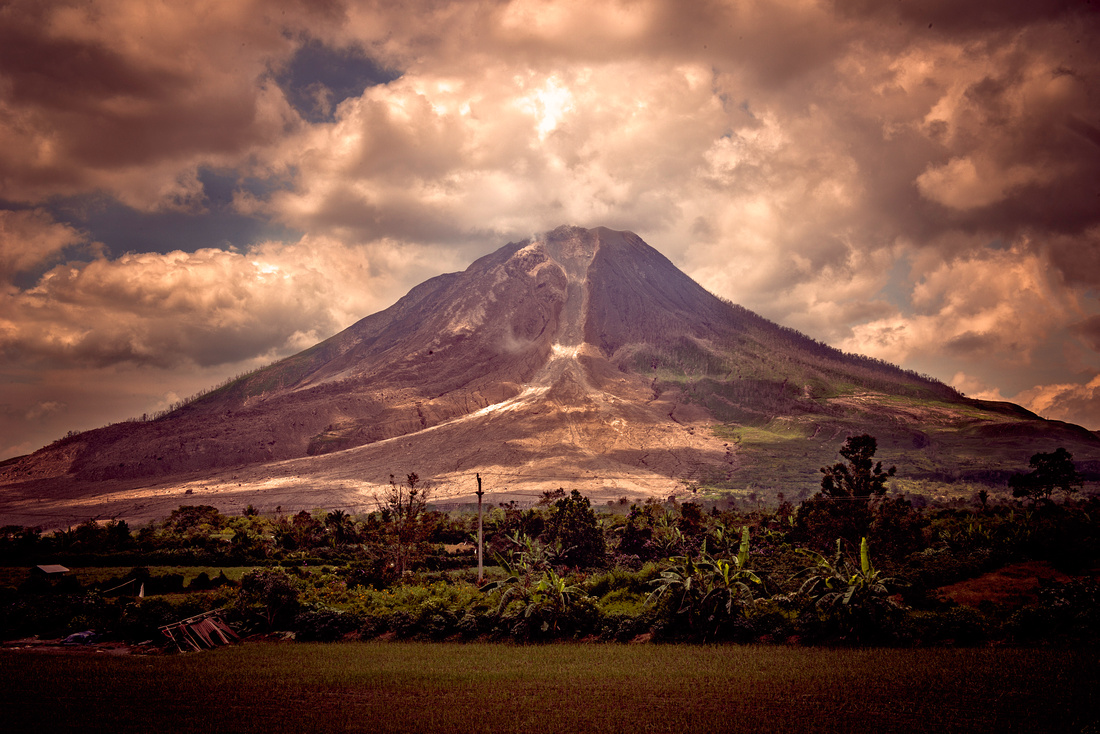

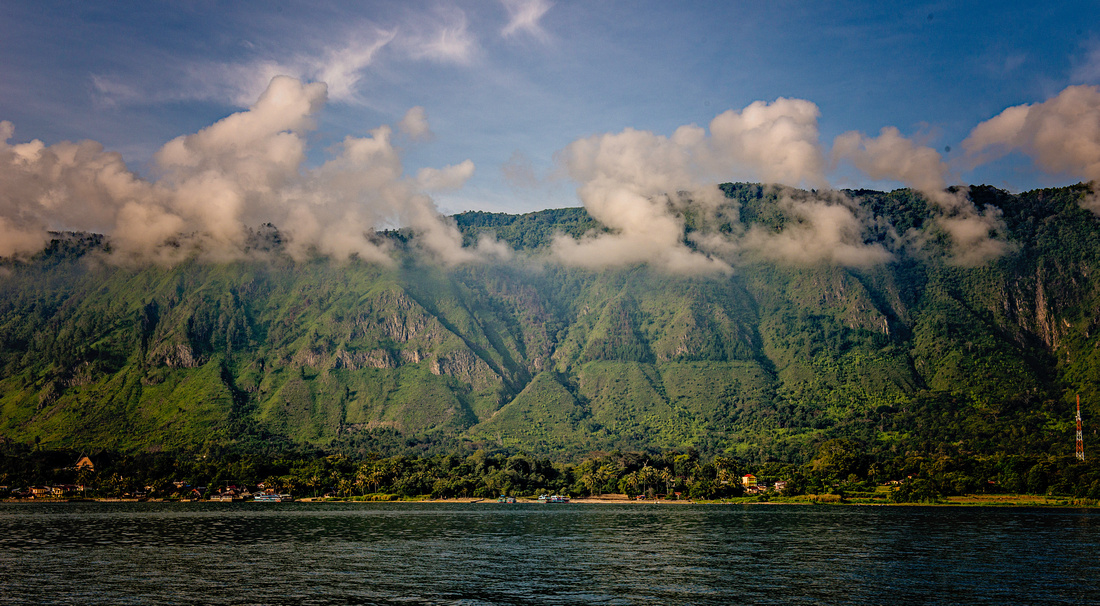

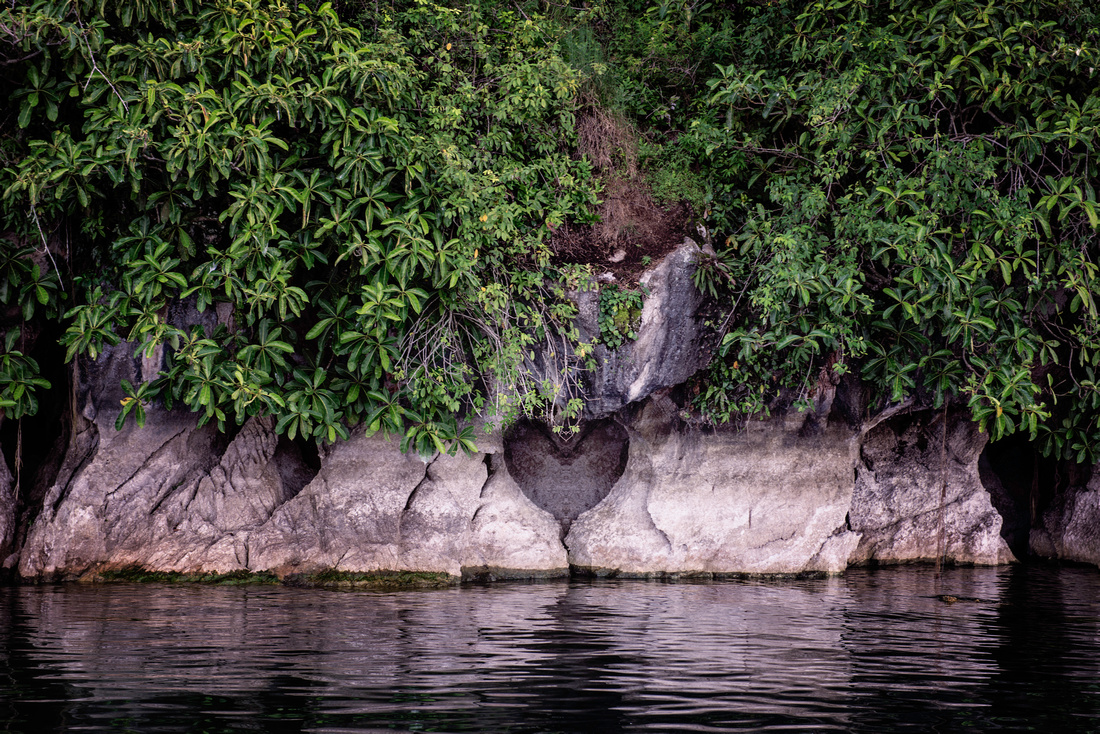

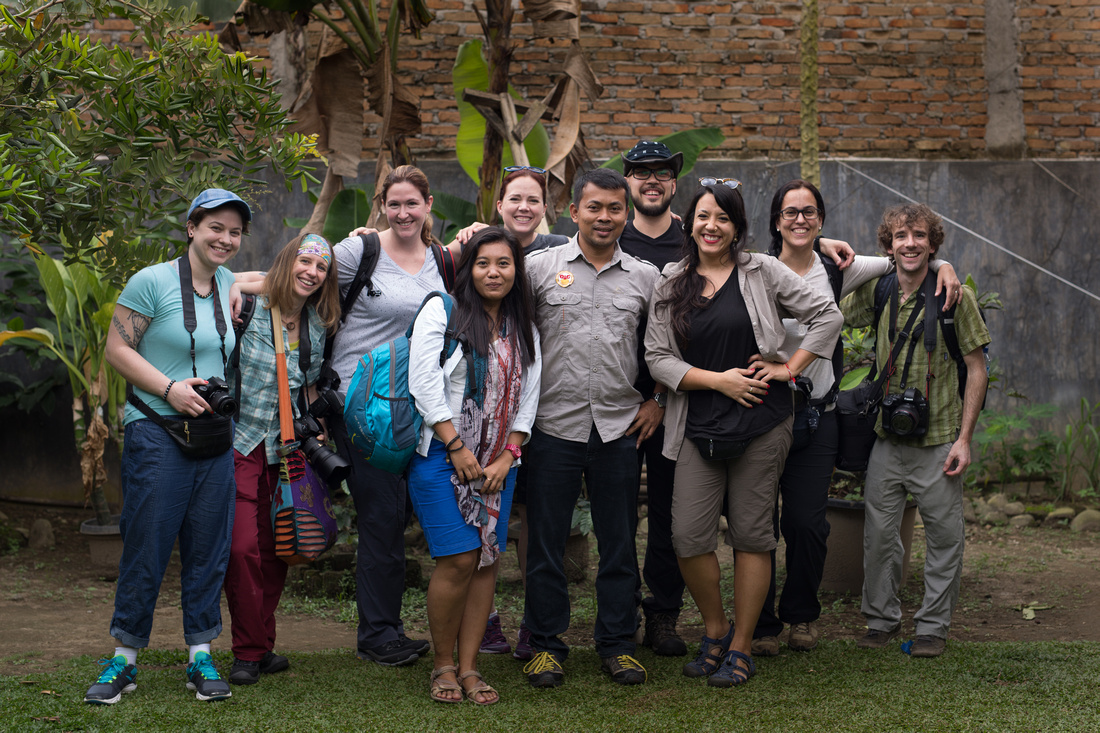

*Group photo courtesy Photographers Without Borders
Our trip began with a trek through the Sumatran Rainforest. This was no easy task. We encountered extremely steep slopes and climbs made of up thick slippery mud and rocks. We had to pull ourselves up and guide ourselves down with swinging vines while overcoming fears of height as we crossed dangerous pathways that wouldn’t pass safety inspections anywhere in the States. I knew from my training that my body was strong enough to handle the obstacles, and step by step, one breath at a time, the will became stronger than the fear. Through the breaths, my mind became strong, as well, giving me the power to overcome. The strength I found in body, mind, and spirit allowed me to witness a magical forest few have ever experienced. It’s as if all of my training in fitness had been preparing me to live this adventure. I was filled with overwhelming gratitude for everything that had led me to this moment, and no sooner landing in that state of grace, did she appear…our first orangutan. Orangutan literally translates into “person of the forest.” Pictures and videos do not come close to capturing the majestic presence of these beings. As soon as we spotted this gorgeous girl, my fellow photographers stepped right into action and began capturing the story. I don’t know if it was my lack of experience, or if reality had just set in, but as I pulled my camera up to my eye, I began crying. I couldn’t shoot. I was so moved by the grace and beauty and meekness of these beautiful creatures. They literally took my breathe away and stole my heart.
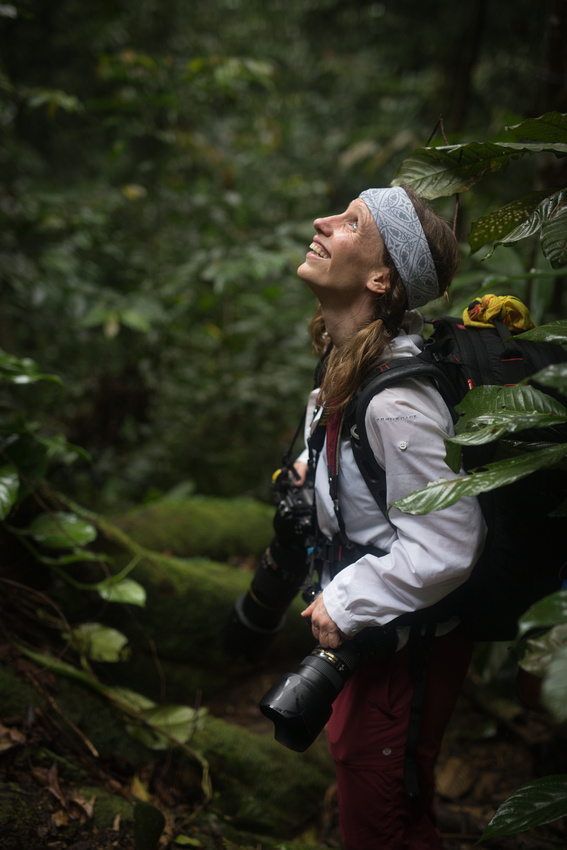

*Photo Credit Danielle Da Silva
I soon composed myself and joined the rest of the group in capturing the gorgeous essence of these beings whom share 97% of our DNA. I was fortunate enough to see 12 orangutan throughout our journey. Orangutans are critically endangered and to look into the eyes of so many of these soulful beings in the wild was a gift. While looking into the beautiful eyes of the first orangutan we spotted, I noticed one was damaged. Our local guide shared with us she was most likely blind in that eye from being shot with air pellets. I should have picked up that the story we were about to capture would be far more difficult than the trek and journey we made to get there.
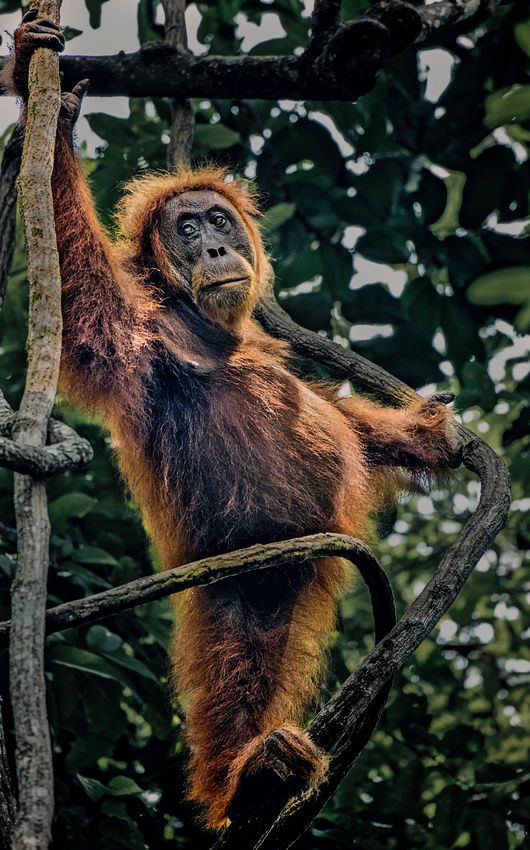

As we continued deeper into the forest, we were fortunate enough to encounter more of the forests inhabitants. I was overwhelmed by the emotion and intelligence orangutans demonstrated. I witnessed one mother pick up her baby and make an umbrella canopy out of leaves to shield him from a torrential downpour.
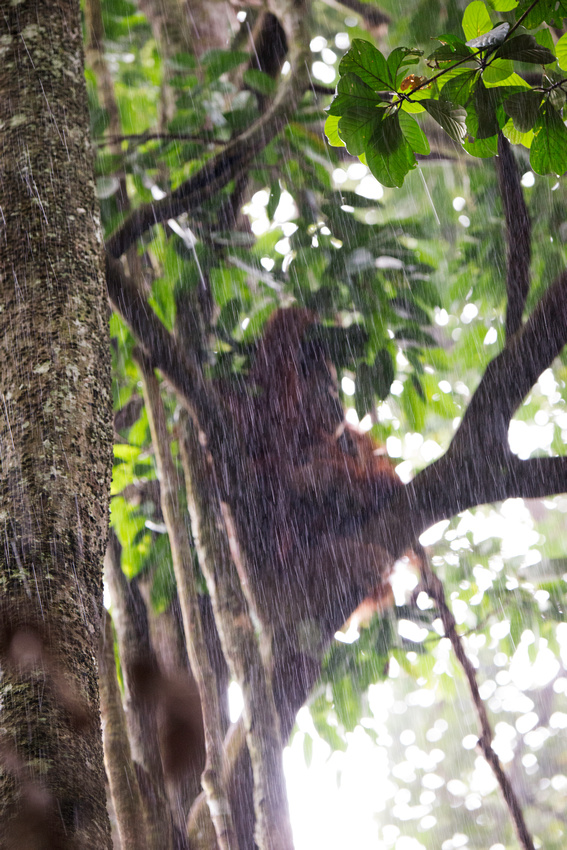

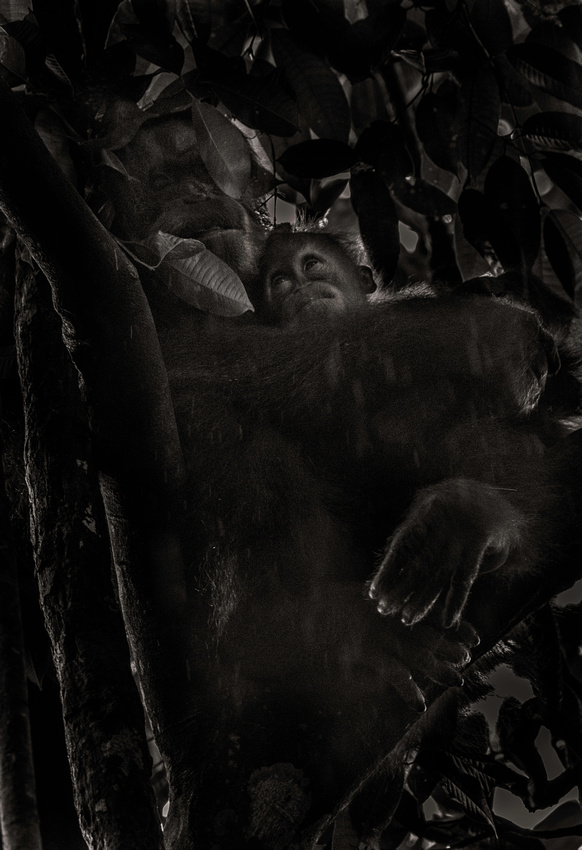

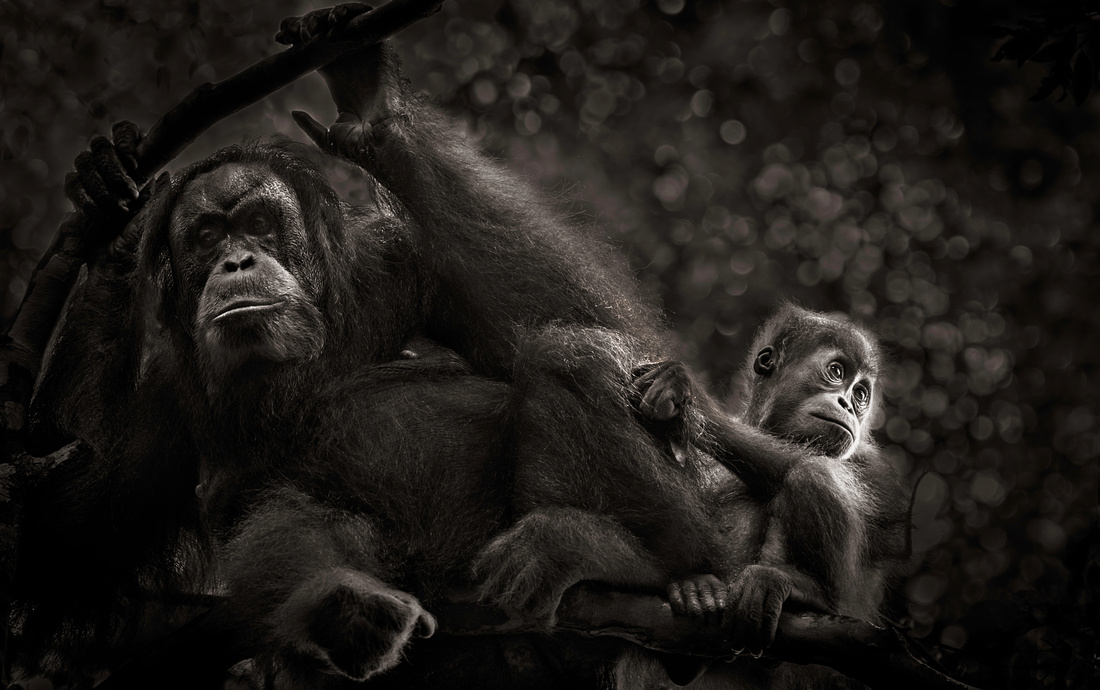

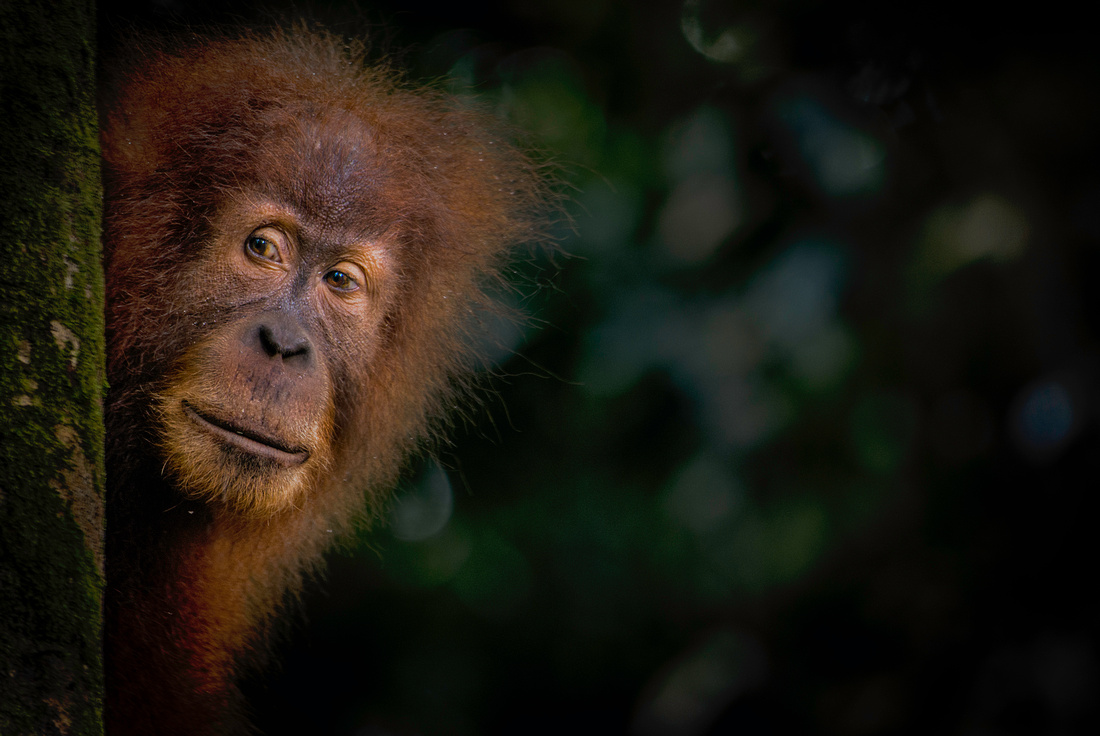
 She is known to the locals as Mina. Unfortunately, forest guides have gotten into a terrible habit of feeding orangutans to draw them closer to allow tourists to take better pictures. Orangutans are brilliant and learned when they see someone open a backpack, it usually means food. Feeding the orangutans taught them to feel safe around humans and to view their gear as a food source. A couple of months before I arrived, Mina reached for a tourist's backpack, thinking she’d grab a snack for her and her baby. The guide, in an effort to protect the tourists he was leading, responded by striking her across the forehead with a machete (her scar can be seen in the pictures above). He left her terribly wounded and bleeding on the trail as her baby helplessly watched. Luckily, Mina recovered and healed, but the locals will tell you Mina is aggressive and mean. Orangutans recognize faces and will act defensively if they recognize someone as a threat. We approached the area where Mina, her baby, and her adolescent daughter were residing. We left our gear behind and out of site. Mina and her children peacefully went about their business without minding our quiet presence. Because we simply observed and didn’t interfere or interact, we never witnessed signs of aggression. What we did witness was Mina being incredibly gentle, compassionate, and nurturing. It amazed me that the humans responsible for teaching the orangutans to behave in a way that encourages them to desire backpacks would so violently attack them for crossing a line they couldn’t possibly understand. As I observed Mina and her children in action, I watched Mina’s daughter make a toy out of a bamboo stick. Their love, their playfulness, their compassion for each other is real and evident. To think those moments almost didn’t exist because of a fear response made my stomach churn. Mina’s tender love for her children is not an isolated emotion or event. We were told an incredible story of another orangutan mother’s love for her child…but before I go into that, it’s important to note some of the threats these sweet creatures face.
She is known to the locals as Mina. Unfortunately, forest guides have gotten into a terrible habit of feeding orangutans to draw them closer to allow tourists to take better pictures. Orangutans are brilliant and learned when they see someone open a backpack, it usually means food. Feeding the orangutans taught them to feel safe around humans and to view their gear as a food source. A couple of months before I arrived, Mina reached for a tourist's backpack, thinking she’d grab a snack for her and her baby. The guide, in an effort to protect the tourists he was leading, responded by striking her across the forehead with a machete (her scar can be seen in the pictures above). He left her terribly wounded and bleeding on the trail as her baby helplessly watched. Luckily, Mina recovered and healed, but the locals will tell you Mina is aggressive and mean. Orangutans recognize faces and will act defensively if they recognize someone as a threat. We approached the area where Mina, her baby, and her adolescent daughter were residing. We left our gear behind and out of site. Mina and her children peacefully went about their business without minding our quiet presence. Because we simply observed and didn’t interfere or interact, we never witnessed signs of aggression. What we did witness was Mina being incredibly gentle, compassionate, and nurturing. It amazed me that the humans responsible for teaching the orangutans to behave in a way that encourages them to desire backpacks would so violently attack them for crossing a line they couldn’t possibly understand. As I observed Mina and her children in action, I watched Mina’s daughter make a toy out of a bamboo stick. Their love, their playfulness, their compassion for each other is real and evident. To think those moments almost didn’t exist because of a fear response made my stomach churn. Mina’s tender love for her children is not an isolated emotion or event. We were told an incredible story of another orangutan mother’s love for her child…but before I go into that, it’s important to note some of the threats these sweet creatures face.
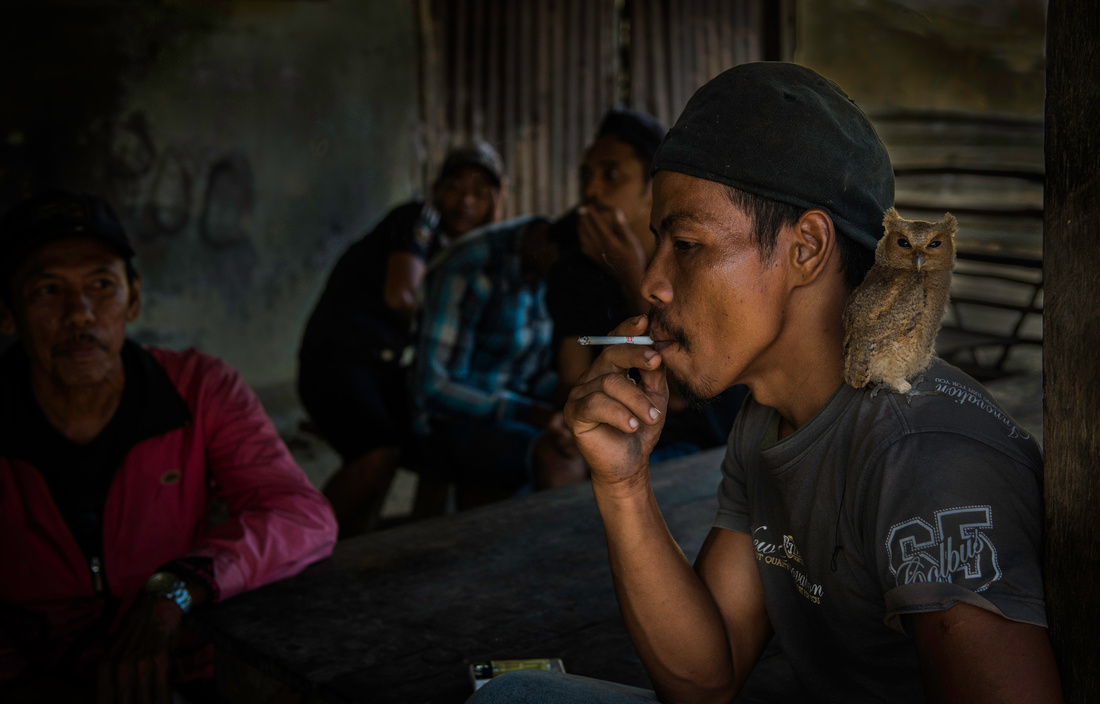

*Picture depicts a group of locals with a captured owl on shoulder representing elevated status symbol.
If uneducated tour guides were the only threat orangutans faced, they wouldn’t be listed on the critically endangered list. Poaching is just one other of the many threats these beautiful beings combat every day. We hear the term a lot but it’s easy to stay detached from the situation when it’s not our reality. After seeing the reality, however, I can no longer be removed from the problem. One of the men helping the Orangutan rescue group we worked with, The OIC (Orangutan Information Center), was once a poacher. He explained that the only way to capture a baby orangutan is to shoot the mother and pry the baby from her arms. Babies are often captured with broken or crushed fingers because they hold onto their mother so tightly, and often in an effort pry the babies from their dead or dying mothers, poachers must break the baby's fingers until they release their mother's fur. After this particular poacher located and shot a mother orangutan in a tree holding her baby, he watched her fall to the ground still clutching her child. The group of poachers moved in surrounding the mom and the baby. She looked around fearfully, aware she was dying, and kissed her baby continuously on the forehead and cheek until her dying breath. The emotion, the fear, the desperation, and love this mother displayed caught the poacher off guard. He didn’t realize the animals could feel and express such love. He changed occupations after that day and reached out to the OIC for help in securing another type of profession. During our journey, a mother elephant was beheaded and her baby was found wandering helpless, hurt, and alone. Poaching happens frequently. The poachers are not bad people, they are people looking for ways to bring in income to feed and care for their families. Most of the locals make $100/month or less. Some feel as if they have no choice and the price tag they are offered is more needed than the peace of a compassionate heart.
Orangutans are not the only target of Sumatran poachers. Critically endangered, elephants, rhinos, tigers, and birds are also on the list. Many people consider captured birds and orangutans as status symbols and keep them chained up and will even clip the wings of birds to keep them from flying away. Throughout our journey in the rainforest we did not see or hear a single bird. Most are gone…leaving the trees and skies of the rainforest eerily silent.
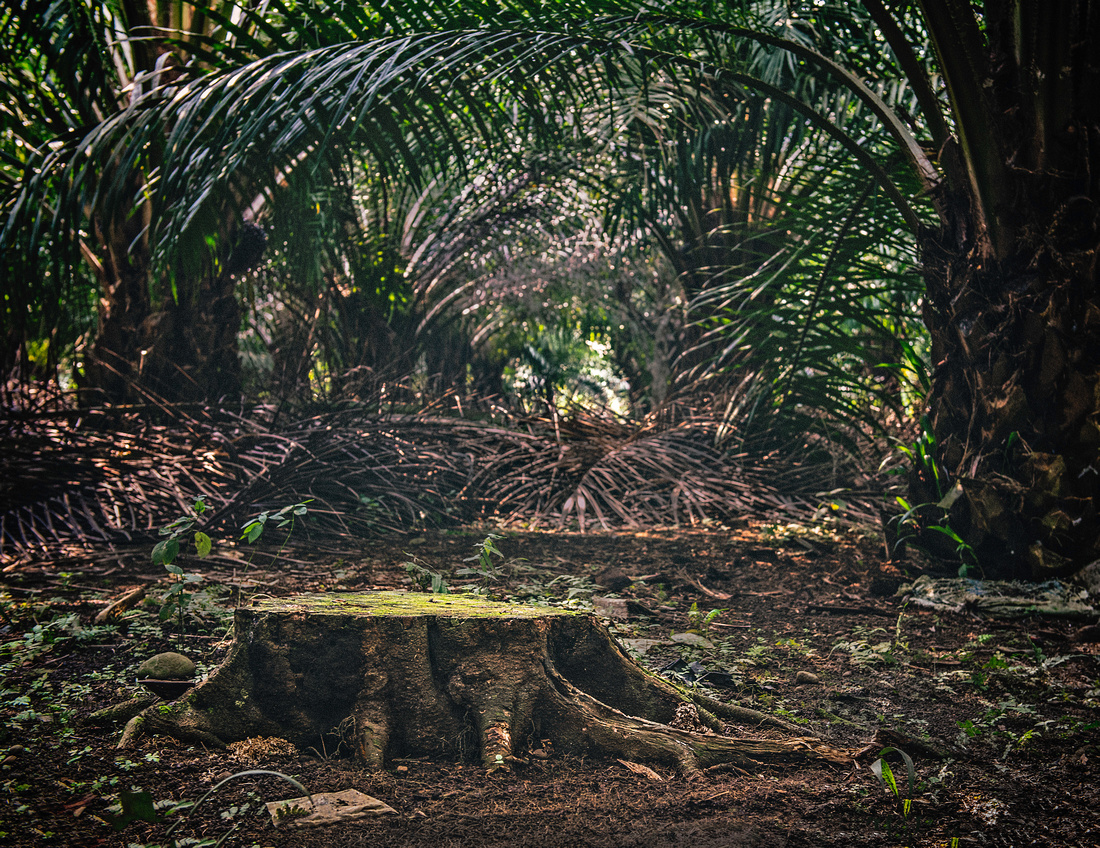

An even bigger threat Orangutans and their fellow forest inhabitants face is deforestation. The rainforest is being cut down and replaced with palm oil plantations. The orangutans have no way to live in or maneuver through these palm trees and if they are seen trying to make their way through, they are often tortured and/or killed. They are treated as a pest rather than respected as the critically endangered and intelligent creatures they are.
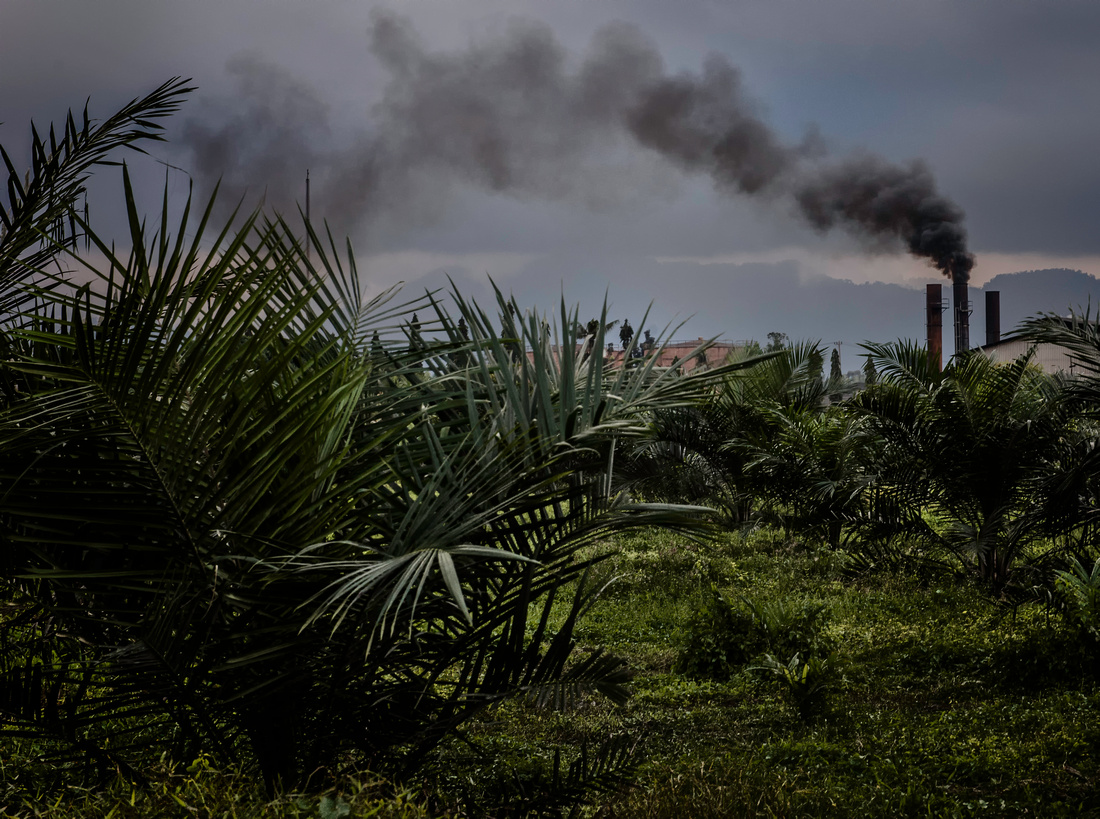

Plantations and factories have replaced most of the island of Sumatra. Some plantations have even illegally encroached on the National Forest. Palm Oil trees stretch out as far as the eye can see. Sumatra is the last place on Earth where the story “The Jungle Book” could actually take place with a natural habitat housing orangutans, elephants, rhinos, tigers, and hundreds of others species, many of which can only be found on this tiny piece of the planet. It is estimated that less than 30% of the rainforest remains and yet parts of it are continuously being burned to clear land for more palm oil plantations. The inhabitants of that area are burned alive with it or terribly injured and harmed in the process of trying to flee.
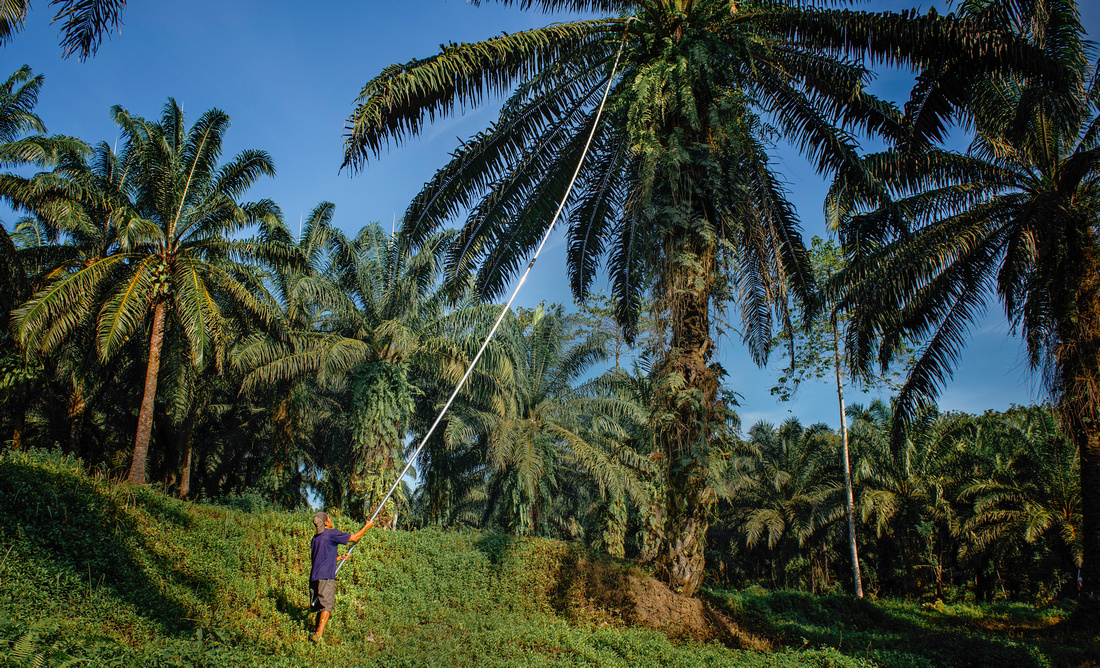

The work on the plantations is strenuous and the pay is little, but for many, it is the only source of income available. Men use long cutting tools to harvest the fruit. Women gather small bits of left over fruits that have fallen and some are paid to apply Round Off, a strong insecticide, to the plantations without the use of gloves or masks. Many pass out and fall unconscious during the process. They are willing to risk their health and well-being on a daily basis to help care for their families.
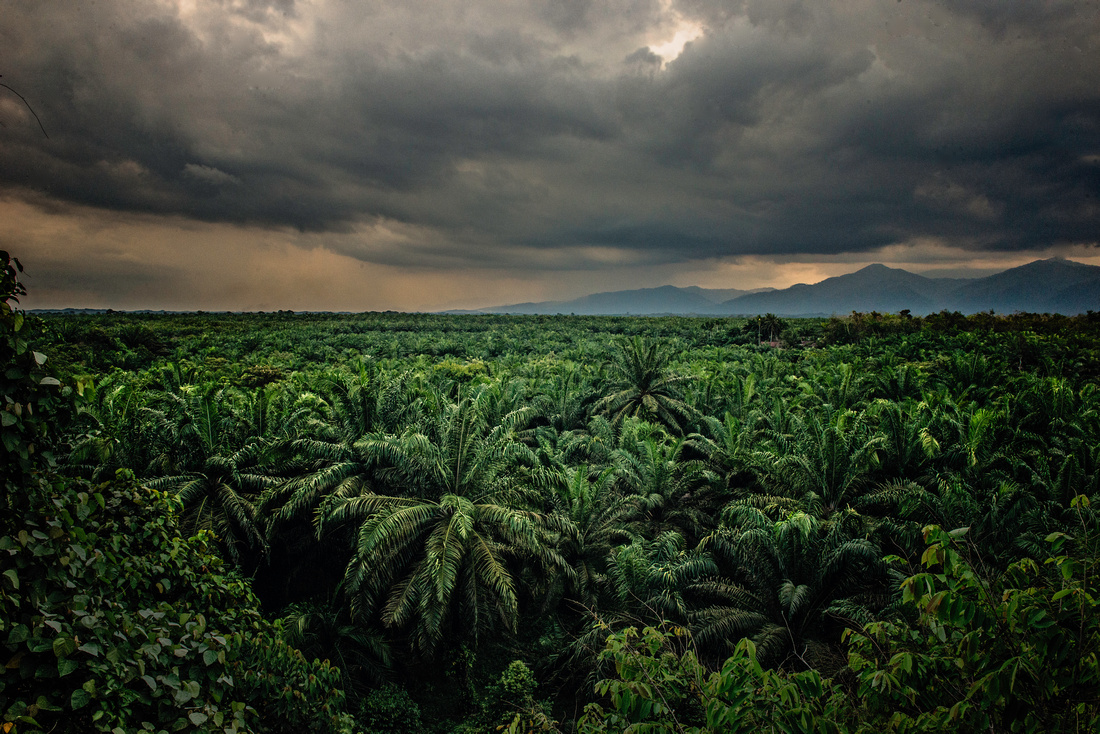

The rate of palm oil plantings and deforestation is terrifying. It is possible that in my life time and in the lifetime of my children no rainforest will remain, taking with it all of its beautiful inhabitants.
Workers are paid to kill any animal on the plantation in order to prevent any potential damage to the harvest. The OIC, however, work tirelessly to try and rescue some of these animals. Some are lucky and are able to be released back into the wild. Others, are not so lucky. Their salvation is a bleak and dim confinement.
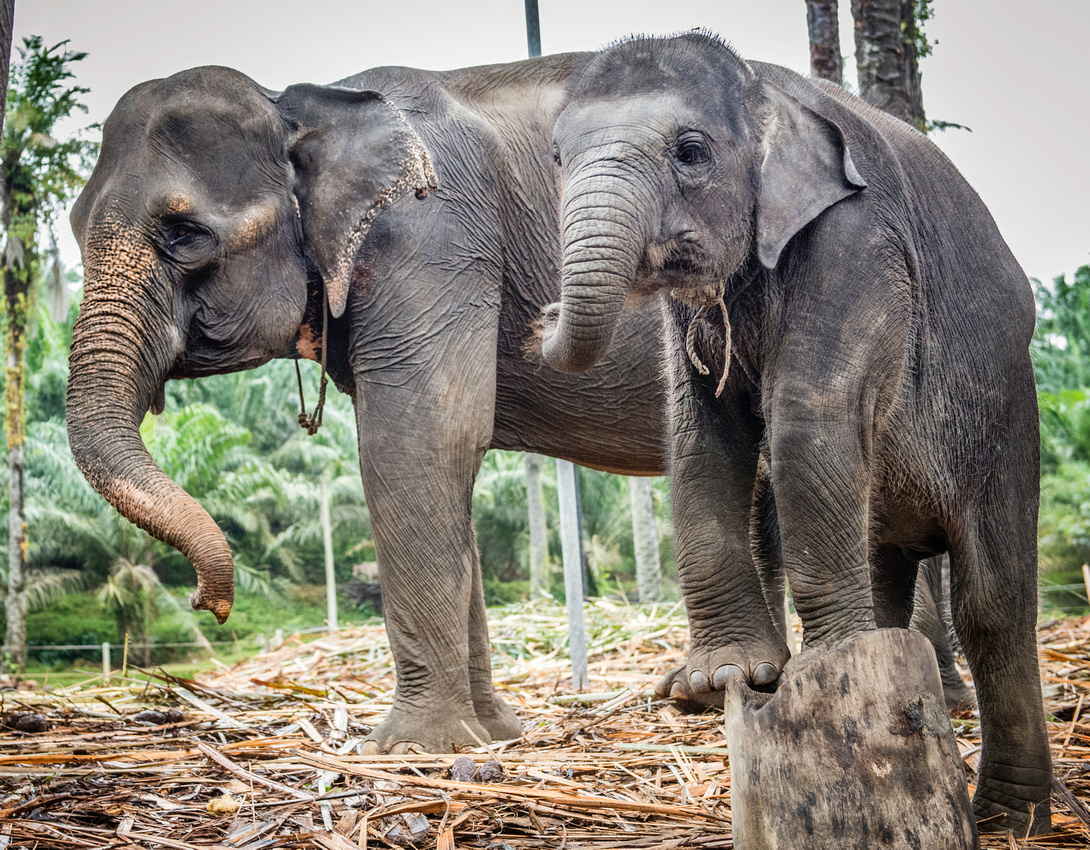

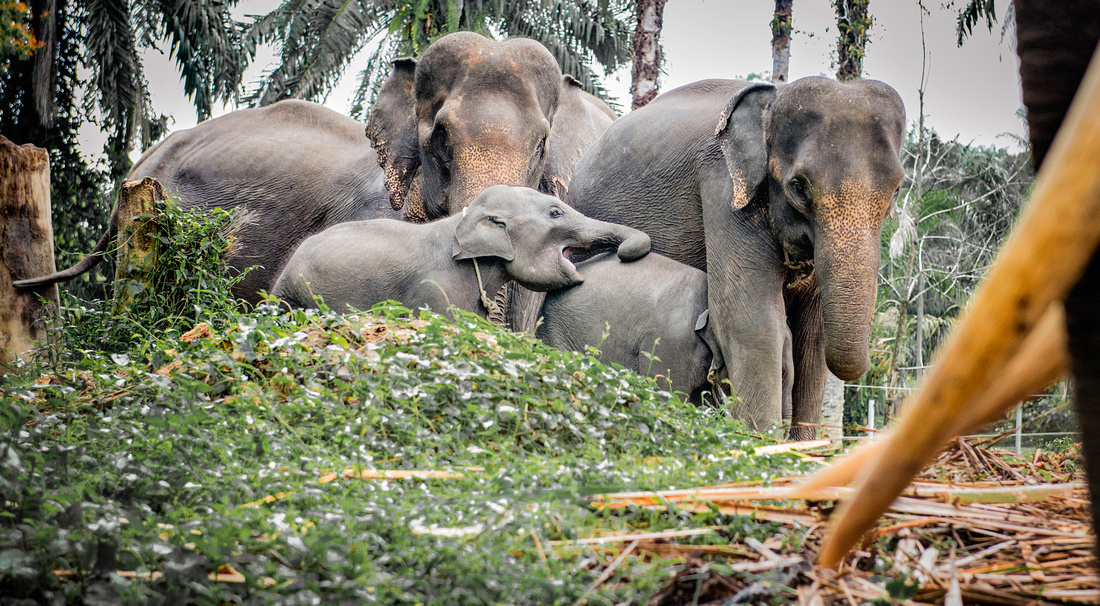

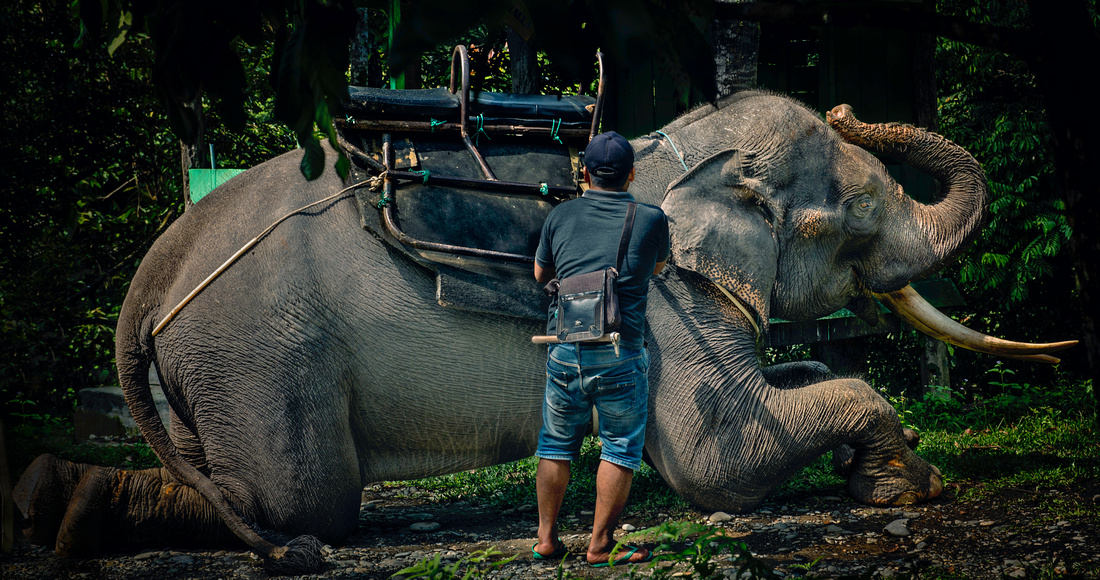

During our expedition, we made a stop to the Conservation Response Unit. I was excited to visit a place that rescued elephants, but the pit in my stomach as we drove to the area warned me the experience was not going to be what I was hoping for. I was quickly educated that in order to get elephants to work with humans, it is common to train them with a tool which very much resembles a pick axe.They use the tool to “break” the animal into submission so it can perform tricks and entertain humans.
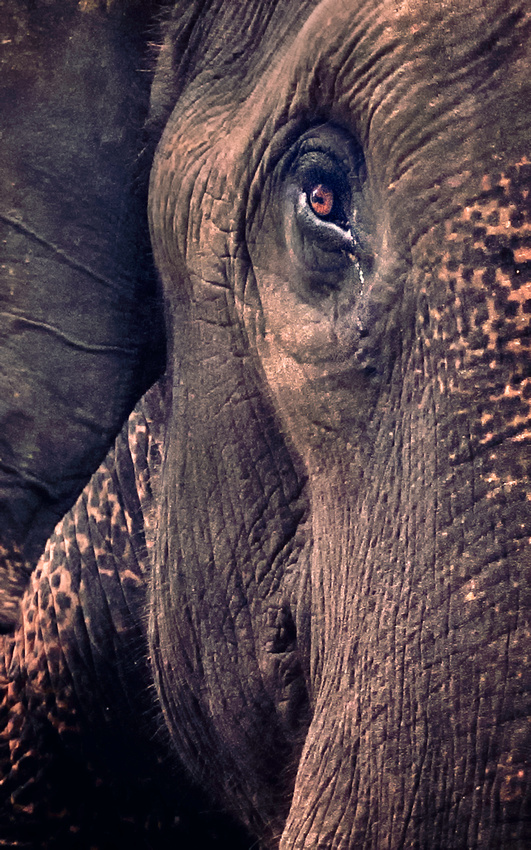

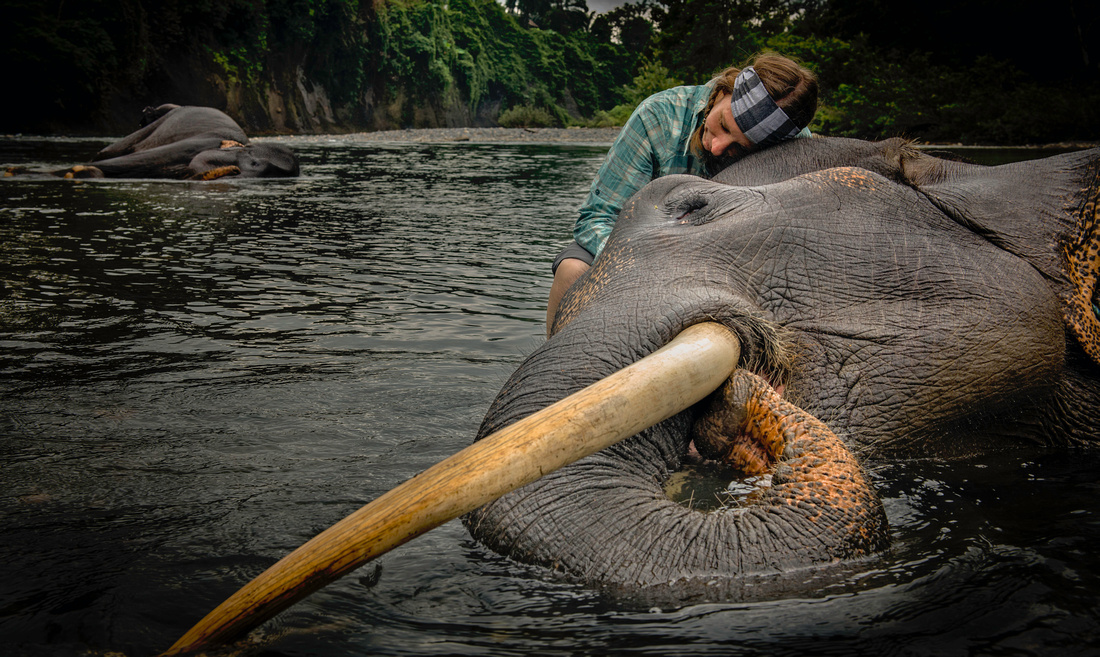
 * Photo courtesy Kristi Odom
* Photo courtesy Kristi Odom
Immediately upon arrival, it was evident conditions were less than perfect. There were a large number of elephants grouped in a small area surrounded by an electric fence. There were male and female elephants of all sizes as well as some calfs. Many were moving in repetitive patterns indicating stress. Immediately, one of the large males caught my attention. He was known as Theo. I’m not sure what it was specifically about Theo that grabbed me attention, perhaps it was he knew I could sense the pain in his eyes, or the fact that I believe he sensed my compassion and sorrow. There was no doubting the deep intelligence and emotion within these animals. I began crying as I stared into Theo’s eyes. He gazed back and a tear fell from his eye. One of the leaders of the group suggested I wait down by the river to calm myself. The elephants would be led down to the river to be washed. Taking her advice, I did just that. The elephants soon were marched in procession to the river. During the procession, Theo and I locked eyes once again. He broke away from the line and started walking towards me. My first thought was “Oh, wow, look at this magnificent being coming right at me!” It was magical and surreal. Then, my brain quickly went into fear mode and I thought, “OH, MY! Look at this magnificent being coming right at me!” I think the trainer noticed the fear take over. He turned and punched Theo and Theo submissively returned to his line up. I held my head in shame and sorrow. Fear kept me from fully experiencing an incredible moment and led to more torture of a being I so desperately wanted to bring comfort to. As Theo immersed himself in the water, I knelt beside him and was overcome with sadness. I cried, for his pain, his situation, and for the fact that I felt completely helpless to intervene in any way. He began to tickle my head with his ear and at one point reached his trunk up around me returning the affection.
Theo let me know he would be okay in his own way. I promised him I would tell his story.
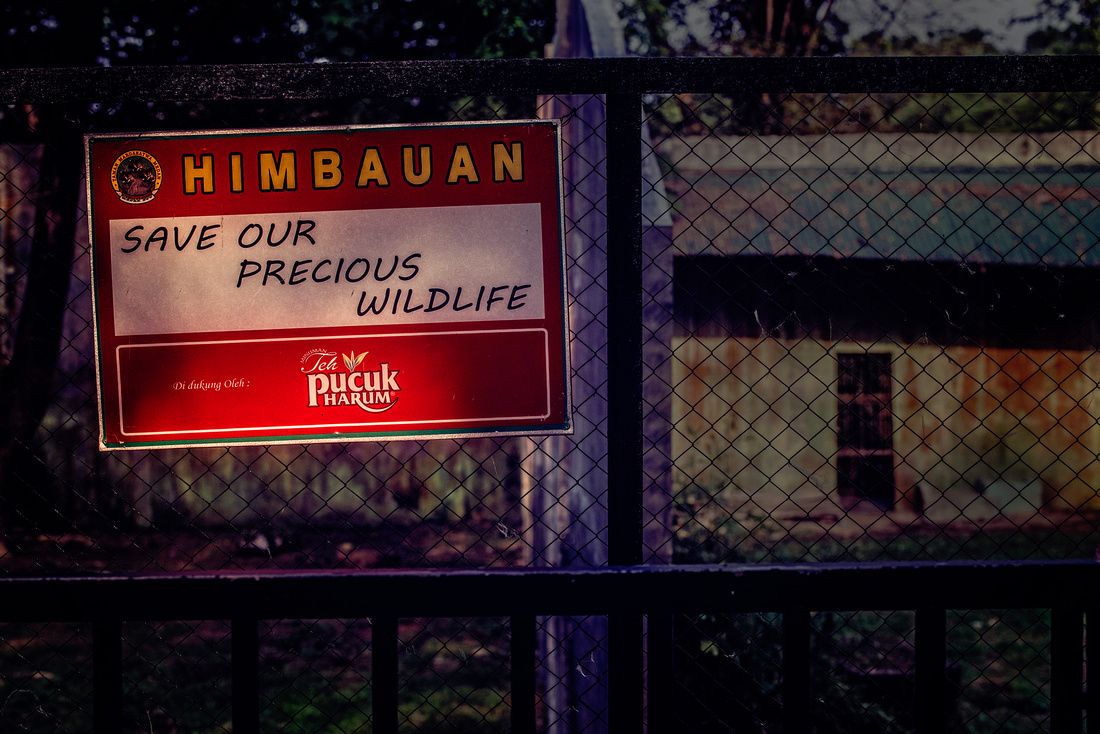

Currently, the only other option for rescue of these critically endangered animals is the zoo. I knew from the moment of seeing the zoo visit listed on our itinerary, it was not going to be an easy day. I can’t even handle ASPCA commercials at home and I was already emotionally exhausted from the Elephant Conservation Unit and the overwhelming threats to orangutans. I voiced my concerns and desire to skip the experience to one of the master photographers leading the trip. Her reply not only gave me strength to handle what I saw, it gave me a renewed purpose. She explained the only way for these animals to have hope, the only possibility for their situation to change, is for someone to tell their story. If those that claim to love animals turn away from doing hard things and sharing the hard stories, there is no hope for change. Change only happens in the uncomfortable and photography provides a voice for the voiceless. She was right. As hard as it was to witness the filth and the suffering, I knew I had to at least try and allow my capturing of their story to be the start of hope for change. We are called to do hard things, and after teaching fitness for many years, I know change only happens when we are willing to work through the hard.
Our hard is nothing compared to theirs…
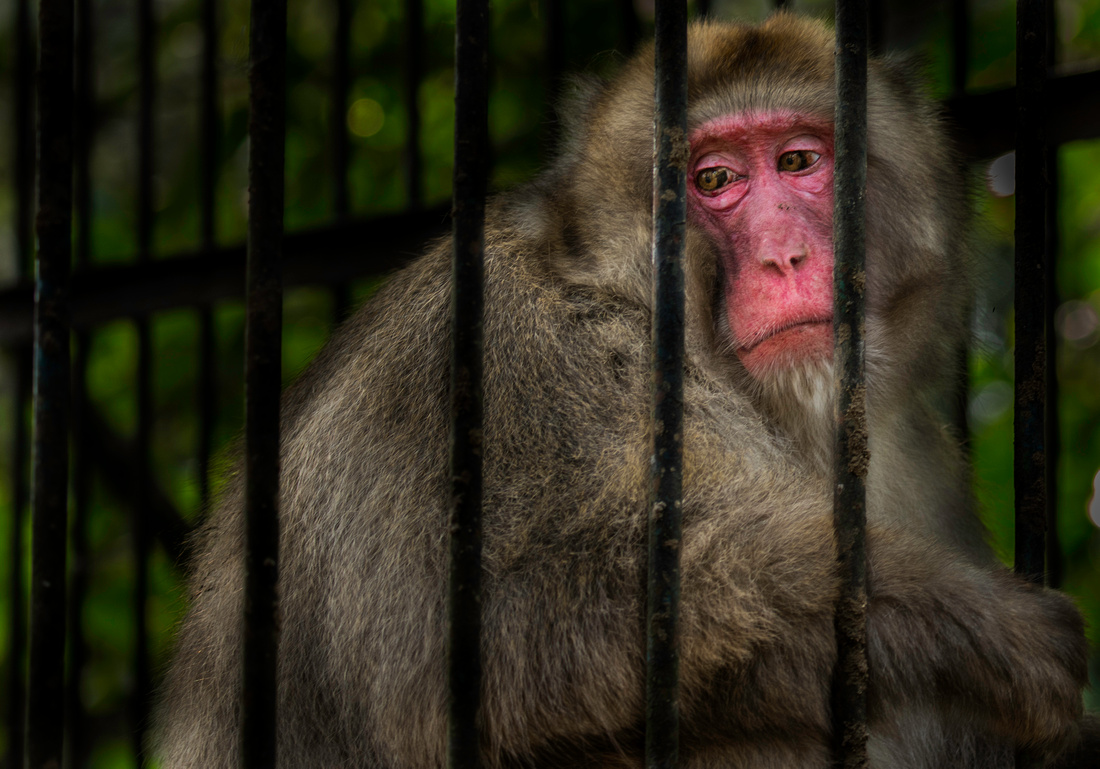

No companions. No space.
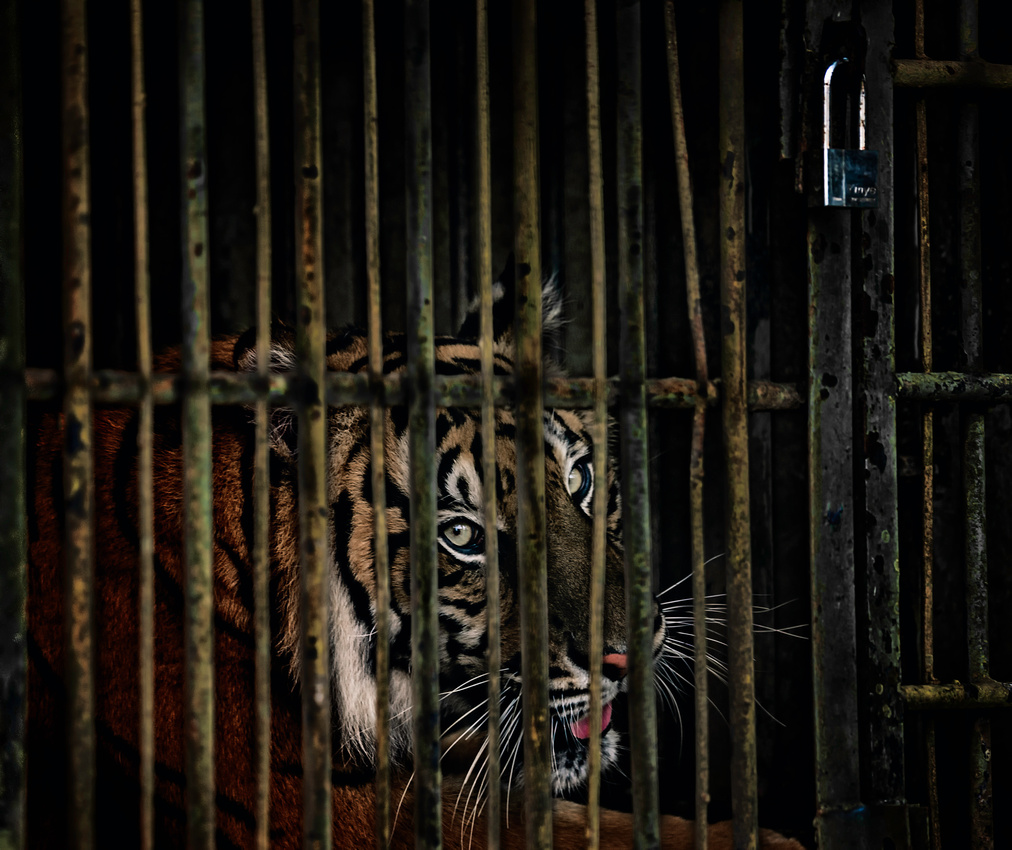

Rotten food, filthy enclosures, untreated illness.
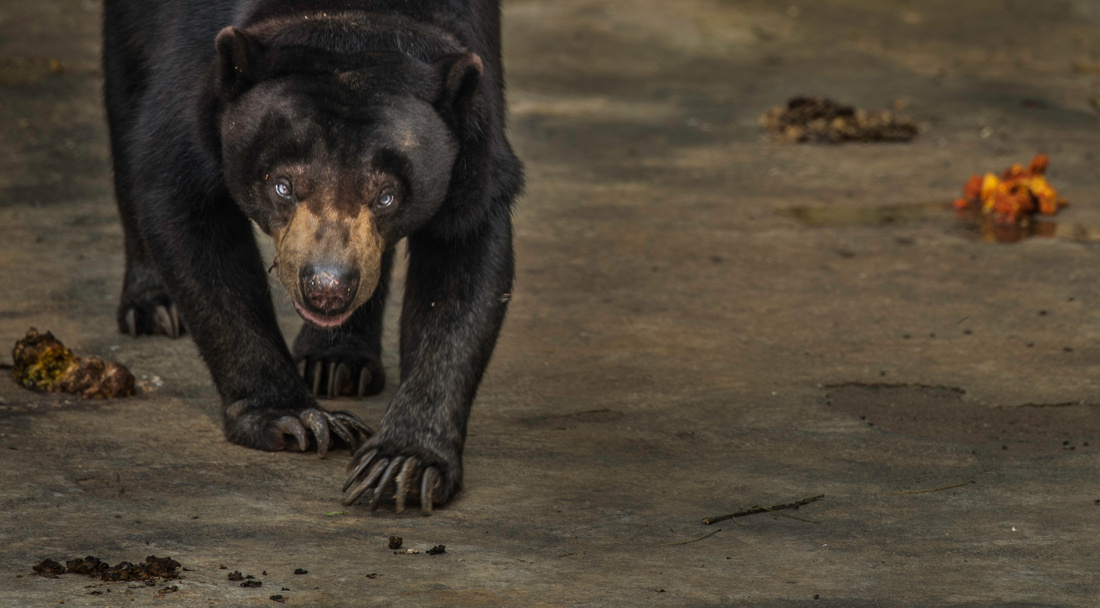

Animals desperately reaching out to feel a bit of nature, but are left only with the sharp sting of wire and concrete cages.
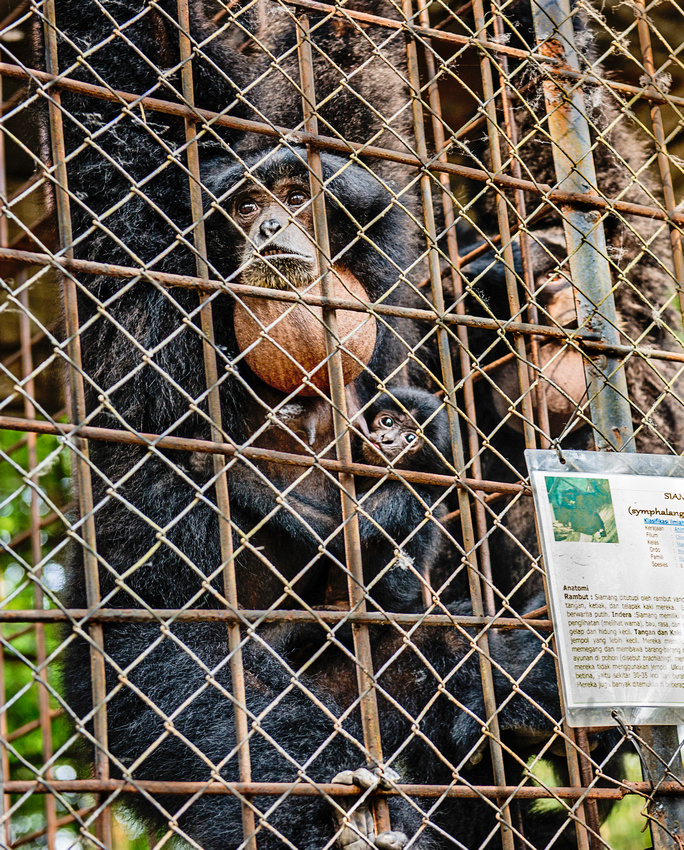

A lifetime prison sentence because their unaltered home isn’t profitable for humans.
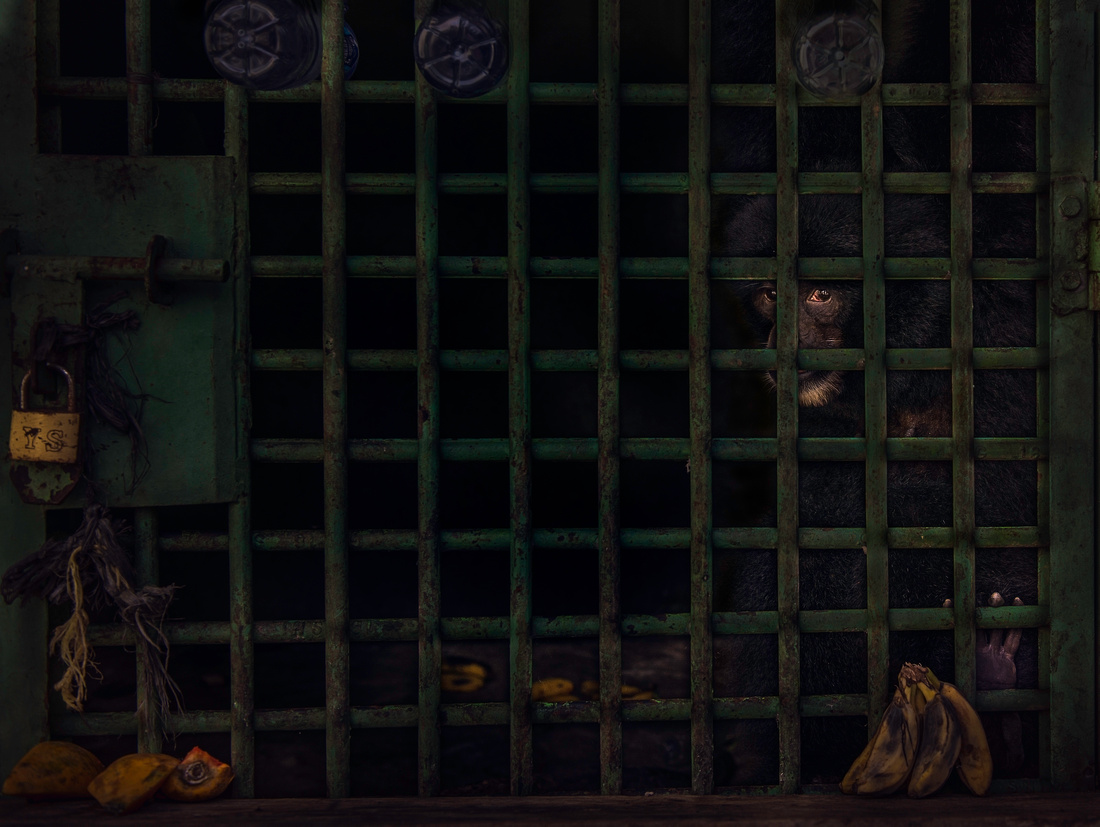

After destroying the homes of these last few remaining animals they are being sentenced to a life of suffering rather than being truly rescued. We can do better. There is a better way if people are willing to step in and help.
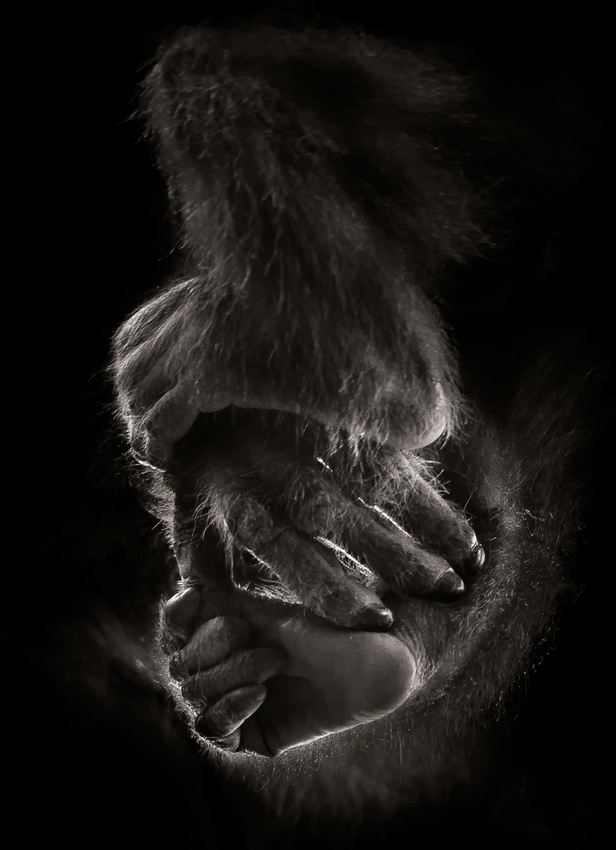

The situation I witnessed overwhelmed my soul. I cried more times on this journey than I can count. But, a single spark can illuminate a room of darkness. With small steps, one breath at a time, change is possible.
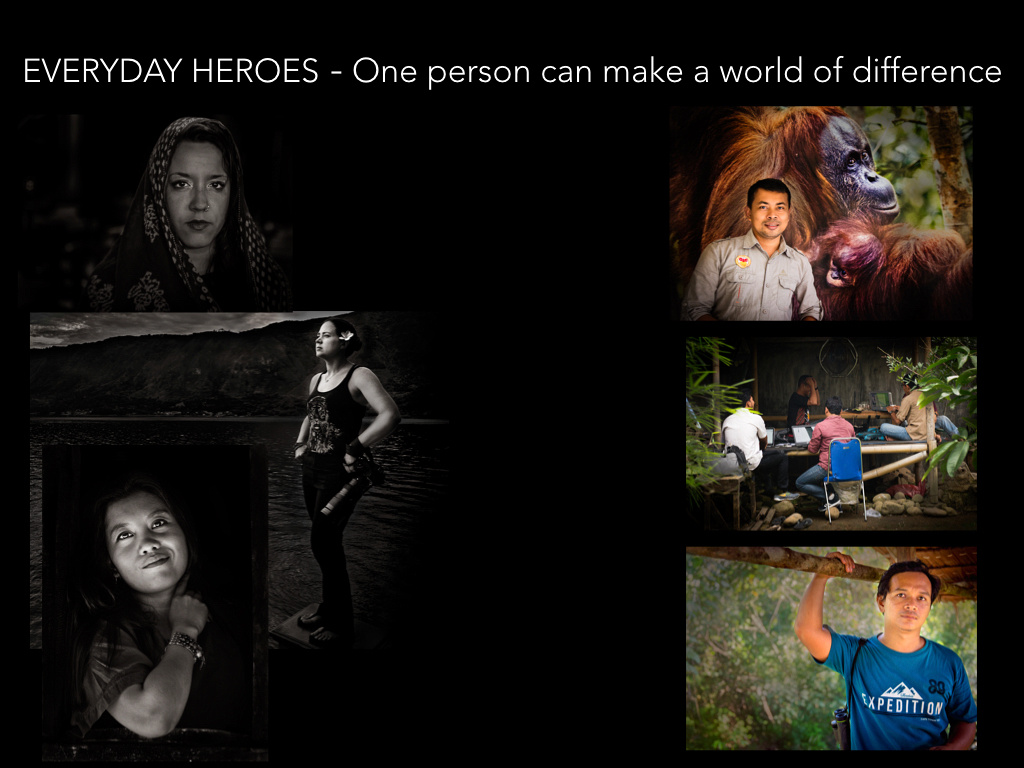

There are a group of committed individuals, unsung heroes, that have teamed together and are creating wildfires of hope and change in the area. They are selfless and often risk their lives. Through them, I was able to experience the beauty of the simple and the miraculous…and I am learning how big of an impact a single person can have.
Danielle, founder of Photographers Without Borders and the Sumatran Wildlife Sanctuary partners with NGOs around the world bringing hope and change; Kristi, master photographer leading conservation efforts and providing voice for the voiceless; Nayla, educator and guide of local and international communities, protector of the forest and its inhabitants ; Panut and his team lead the charge in reformation, rehabilitation, education, opportunity, and possibility. Days after we left, he and his team were able to release an orangutan back into the forest after rehabilitation from horrible circumstances. The orangutan had been found with one finger cut off from a machete, one finger crushed, 11 gun pellets lodged in its head causing blindness, and a maggot infested bamboo spear embedded into its back crushing one of its lower vertebra. Panut and his team at the Orangutan Information Center made it possible for this guy to continue living, and living well (CLICK HERE TO SEE PICS OF HIS INCREDIBLE RESCUE AND RELEASE). Rio is another member of the OIC team. He is a botanist and his work is a testament to the world that seemingly impossible situations have possible solutions. Together, this amazing team created the first successful reforestation site.
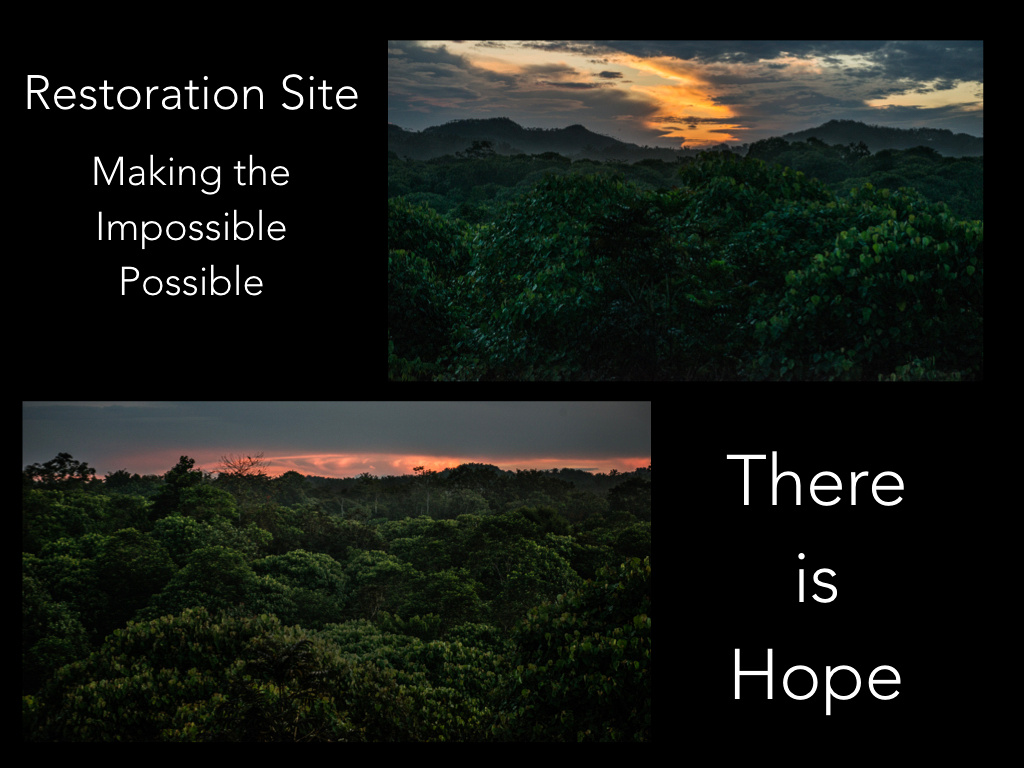

Palm oil trees use so much water that over time the soil on the land is rid of all of its nutrients and is rendered completely useless. At the restoration site, the team used a composting process to nurture the damaged Earth. They gathered seeds of indigenous trees from the forest, germinated the seeds, and nurtured the seeds for at least a year during the maturation process into seedlings. The seedlings were then replanted into the re-nourished land. The forests above are a small glimpse of the incredible results of these efforts. This is not a fast process, but proof that small steps over time lead to great change. Some of the critically endangered residents of the disappearing forests of Sumatra are now making their way over to and creating homes in this new forest on what was once seen as useless land.
Obstacles are being overcome on a daily basis. Areas are now being mapped with drones allowing for illegal encroachment of palm oil plantations to be challenged, cut down, and restored. Local villagers are being educated and offered better employment opportunities through the process offering them hope and reason to help preserve the land. During the end of our trip, we were fortunate enough to witness a tree cutting ceremony where government officials actually came down to commemorate the cutting down of illegal palm oil plantations and the beginning of the replanting of the forest. Their presence and approval came after large fees, plenty of red tape, and lots of persistence, but it came.
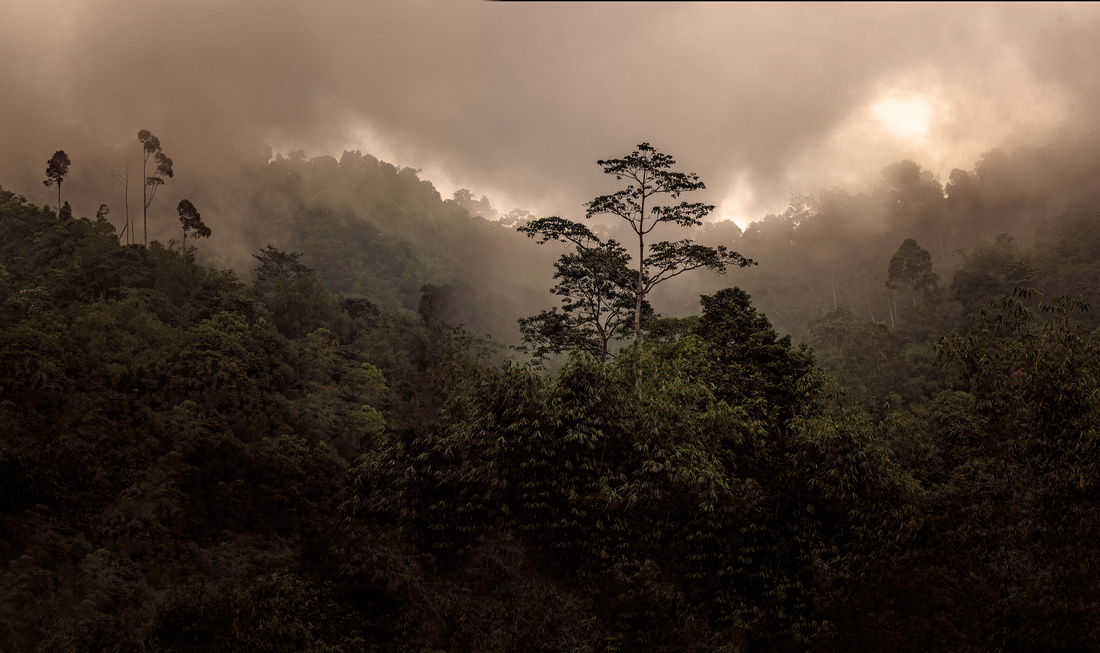

The Sumatran Wildlife Sanctuary is working to purchase land surrounding the National Forest to protect and to become a safe haven for displaced animals and to further preserve the last remaining bits of forest.This land will become a natural habitat area providing an alternative from zoos and conservation units for animals needing care.
As I mentioned, the harshness of the situation became very hard to handle at times. I wondered if, despite all of the good I was witnessing, it really was possible to make a difference. Then, I remembered a story of a young boy who was standing on the shore. He looked around and noticed thousands of beached starfish and realized the tide was going out and the sun was coming up. Knowing that these starfish would soon die, he began to pick them up, one at a time, and throw them back into the ocean. An old man saw him and said “boy, you are wasting your time. There are thousands of starfish out here, you’ll never be able to make a difference.” The boy respectfully listened to the man and nodded. Then, he bent down to pick up a starfish, threw it into the ocean, and said “I made a difference to that one.”
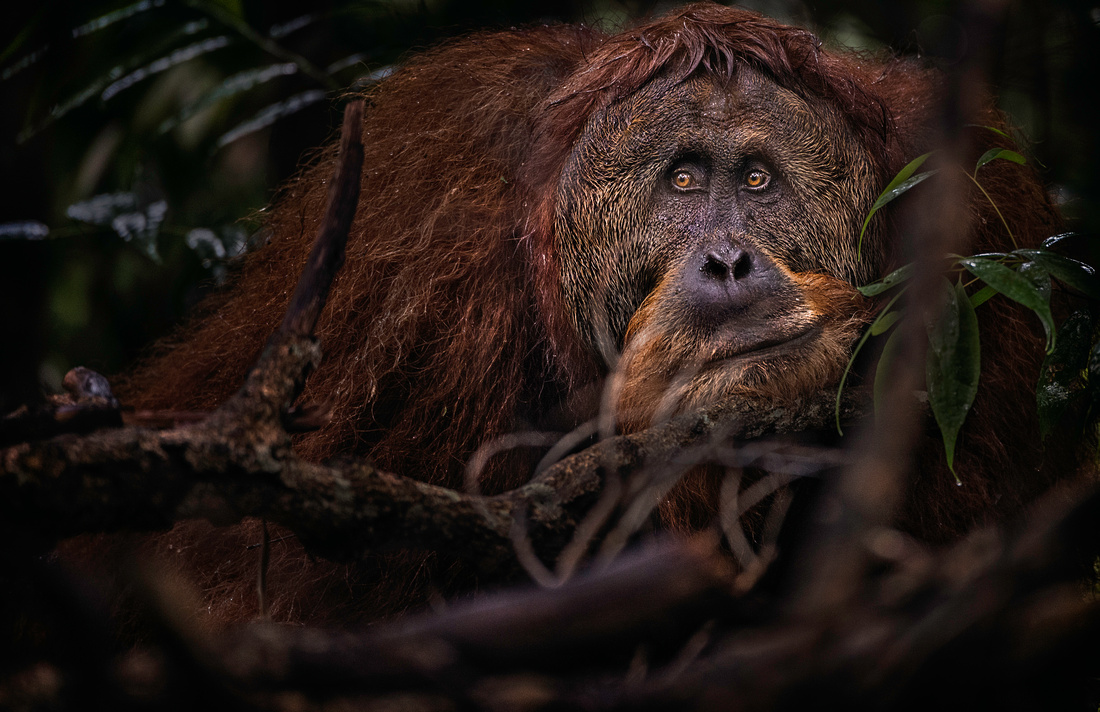

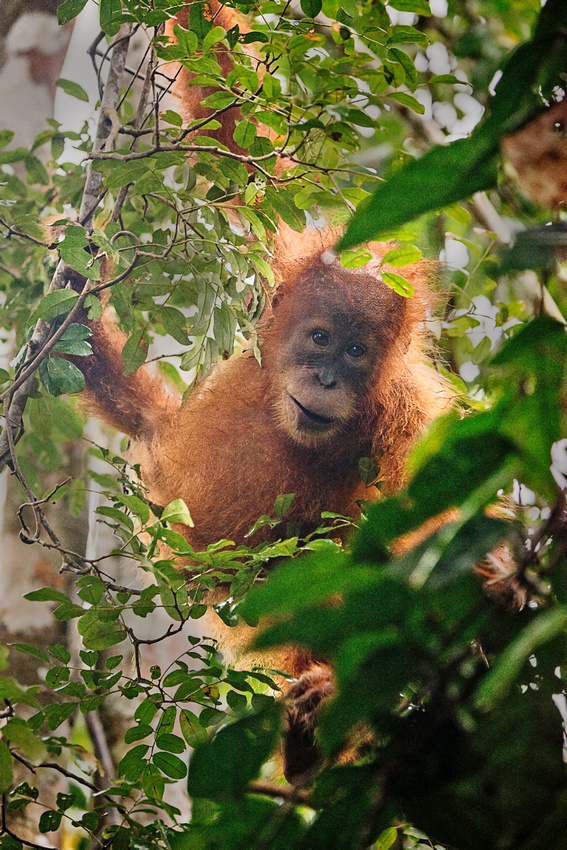

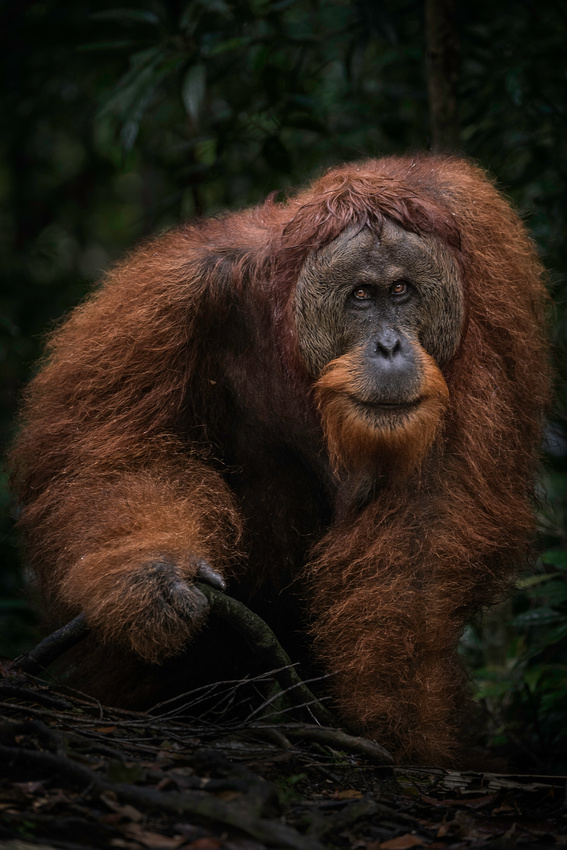

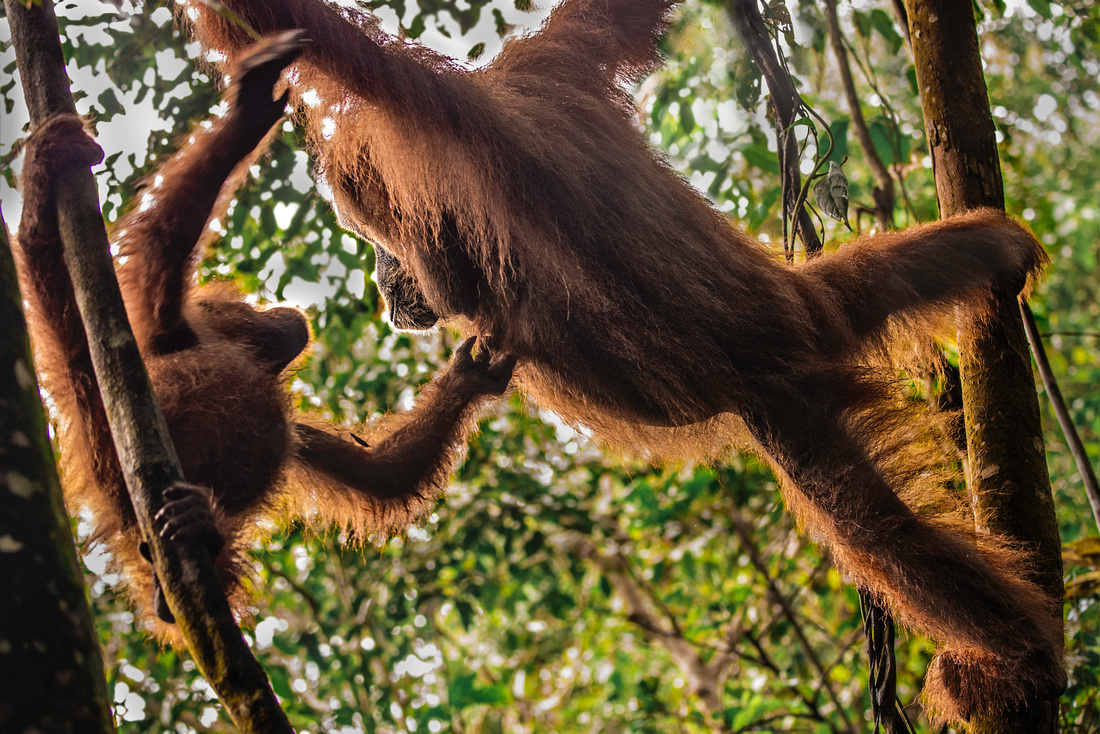

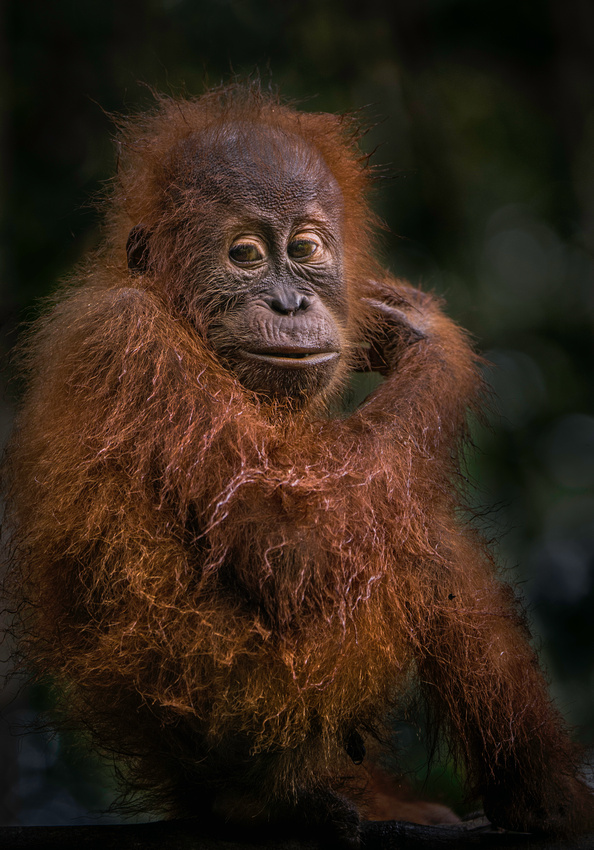

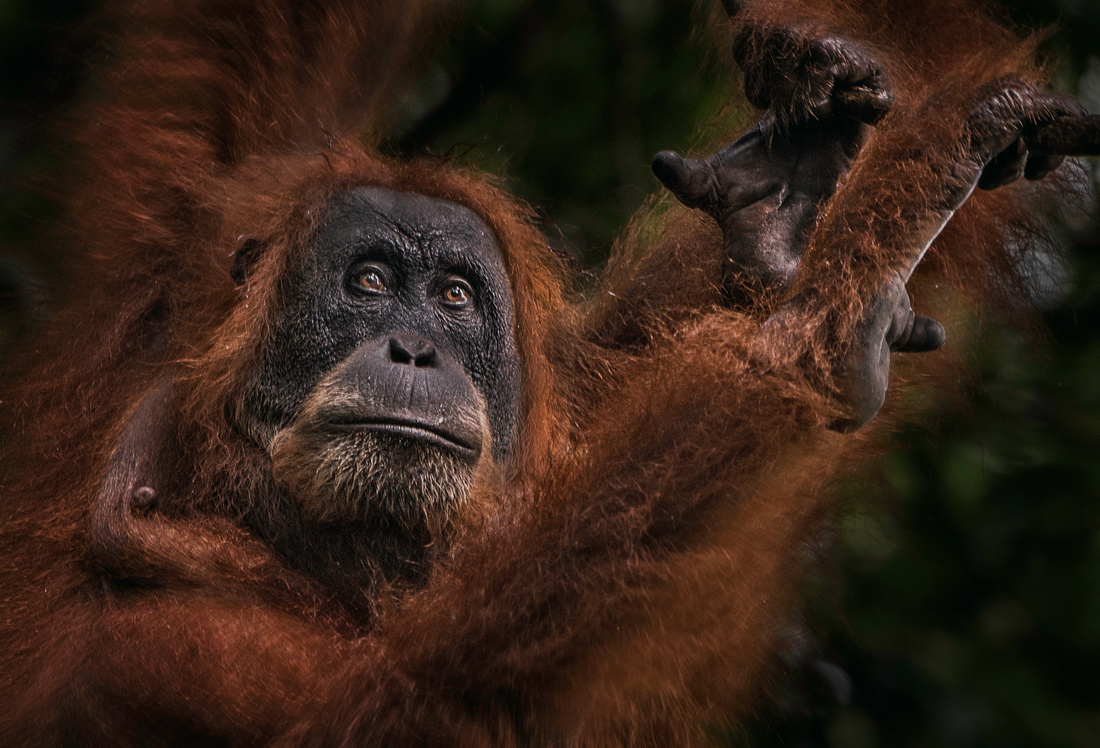

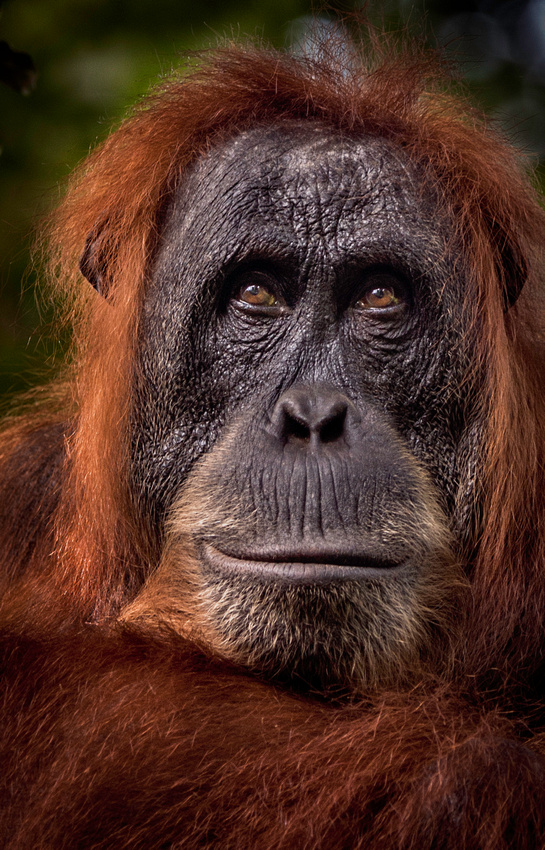

I may not be able to protect all of the forest and animals in Sumatra, but I can save some. I can be a part of donating to sanctuary purchase and conservation efforts. I can share my story to heighten awareness and offer ways for others to get involved. I can support and tell the stories of the light makers in the world who are fighting and giving everything they have to save the last little bit of this magical place.
One breath at a time, small steps lead to big changes. Single drops lead to great ripples being sent forth. I set out on this journey to learn about photography. Instead, I discovered how to use the art of painting with light to be a voice for the voiceless. Imagine the difference that could have been made if the old man in the starfish story decided to help the boy. When the power of me becomes the power of we, we transform impossible into I’m possible.
Since returning home, I have verbally shared this story with hundreds of students, co-workers and friends. One of my pictures ranked second place in an international photo competition. More importantly, my small step in simply sharing my story and pictures has brought incredible awareness to palm oil usage and lifestyle change in efforts to make this world a better place. These ripple effects would not have been possible without a willingness to get out of my comfort zone, to overcome fear, and deafening internal and external critics alike. We weren’t meant to play small, nor are we meant to do real living alone. Impossible becomes possible when we all show up to play on the field where our passions and compassions meet.
Throughout this journey I learned that real living means not just going through motions. It is being awakened to our connectedness to each other, to those in our families, our communities, and even to our brothers and sisters across the planet. Real living means doing what we can to make a positive difference in this world and it often involves being courageous enough to listen to the soft whispers in our hearts and willingness to keep moving forward regardless of the challenges we face.
My Sumatran story is far from over. I’m not sure what the next chapters are, but I do know the people and animals living there took root in my heart and there is still so much work that needs to be done. I do know it starts here…with the sharing of stories we were given, the stories that will continue to bring a ripple effect of hope and change.
To learn more about palm oil usage and efforts to save orangutans and learn how you can take part in bringing about a world of change, please visit the following links:
OIC: Orangutan Information Center
The Orangutan Project: https://www.theorangutanproject.org/
Sumatran Wildlife Sanctuary: http://www.sumatranwildlifesanctuary.org/
LOVE BIG. LAUGH LOUD. HUG HARD. WRITE ON.
*Deep Gratitude for Mindset Coach Janey Brown, Truth-Seeker Carla BeDell, and Task Manager Kara Angell that sparked the written sharing of this story, for my Sumatran/PWB Family whom gave me the strength and inspiration to commit to a life of visual story telling, Katie Dixon for helping me to understand that fitness really is just practice for cultivating habits for real living and whose wisdom is woven throughout this post, to the unending love and support of my incredible husband and children who support and encourage me on whatever crazy adventures my heart embraces, and for anyone and everyone that gifted me with the time to share my tale. Your light and gifts make for wonderful real living each and every day and I am beyond grateful to be connected to such inspirational souls.